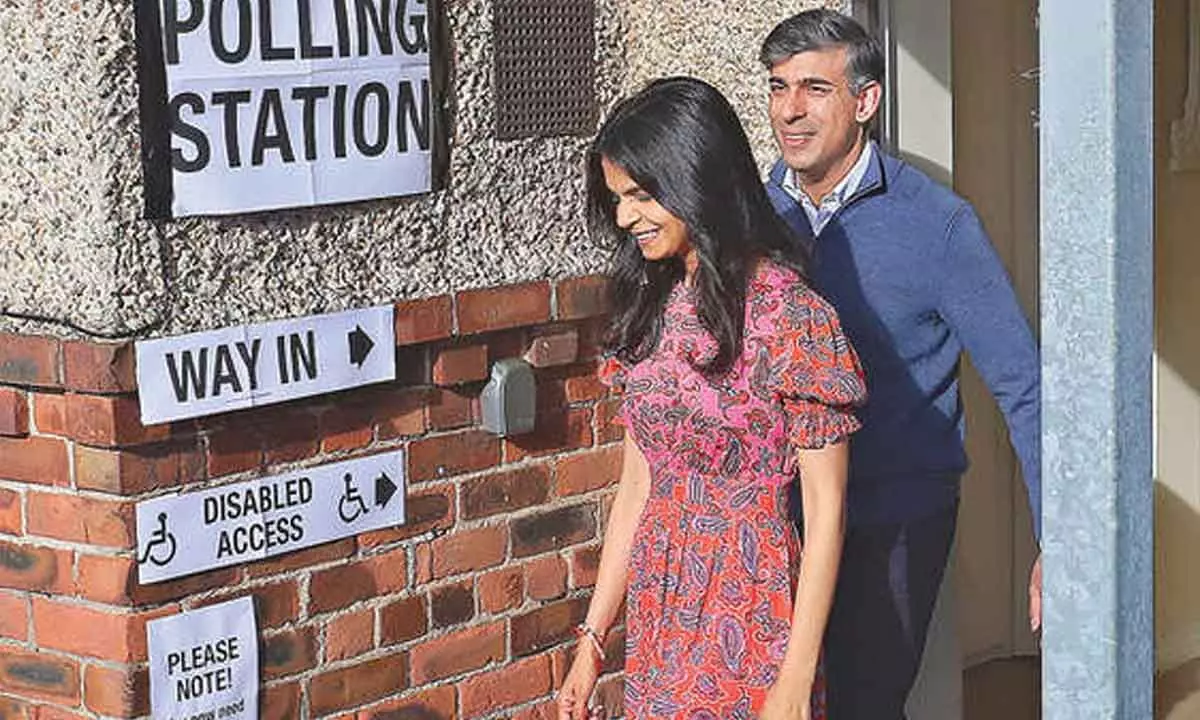As millions vote, future of Sunak hangs in balance

The future of Rishi Sunak as Britain's first Prime Minister of Indian origin and the leader of the Conservative Party
London : The future of Rishi Sunak as Britain's first Prime Minister of Indian origin and the leader of the Conservative Party – fighting anti-incumbency of 14 years – hangs in the balance as millions cast their ballots in a historic general election on Thursday.
The British Indian leader and the man who wants his job – Labour leader Keir Starmer were among the early voters from an estimated 46 million registered voters as around 40,000 polling booths opened across the country at 7 am local time. Sunak and his wife Akshata Murty walked hand-in-hand to their local polling booth on a sunny day in his constituency of Richmond and Northallerton in Yorkshire, northern England.
A little later, Starmer and wife Victoria were at their polling station in Camden, north London, sporting Labour red colours. “Today, Britain can begin a new chapter,” Starmer told voters in a statement. “We cannot afford five more years under the Conservatives.
But change will only happen if you vote Labour,” he said. Sunak, meanwhile, took to social media to drive home his message: “Polls are open. It's time to stop the Labour supermajority that would mean higher taxes for the rest of your life.”
Sunak, 44, is up against voter angst towards the incumbent Tories after 14 years in power and has had to contend with trailing far behind 61-year-old Keir Starmer-led Labour Party throughout the six-week campaign. Earlier, both leaders wrapped up their six-week-long campaign with contrasting messages – Sunak urging voters not to hand "tax-raising" Labour a "supermajority" and Starmer playing down the prospect of a landslide win for fear of a low turnout impacting the final outcome.
Candidates are being fielded for 650 constituencies across England, Scotland, Wales, and Northern Ireland, with 326 required for a majority in the first past the post system. Besides the two main parties, voters will be choosing from a list of candidates representing the Liberal Democrats, Green Party, Scottish National Party (SNP), SDLP, Democratic Unionist Party (DUP), Sinn Fien, Plaid Cymru, the anti-immigration Reform Party and several contesting as Independent. Polling experts have forecast a low turnout, which stood at 67 per cent in the last general election in December 2019 when Johnson won a solid majority on his get Brexit done message. If opinion polls are to be believed, the incumbent Tories are in line to win anywhere between 53 and 150 seats, with Labour projected to win a landslide. This will lead to Starmer taking over as Prime Minister, the first Labour leader after Gordon Brown to enter 10 Downing Street since 2010.
Since this year, carrying an identification document to the polling booth has become compulsory in UK elections, which are open to all registered adult voters resident in the UK including Indians as Commonwealth citizens. Once the votes are cast and the booths officially close at 10 pm local time, the focus shifts to the definitive exit poll soon after, which would give a fair snapshot of what can be expected UK-wide. Counting would commence up and down the country right away, with the first results expected just before midnight local time. The UK has a five-year general election cycle and Sunak had until January 2025 to go to the polls but chose a surprise summer election when he named July 4 as the date in May. It is the first time he is seeking the voters' mandate, having been chosen Tory leader and Britain's first Indian heritage Prime Minister by the party membership following political turmoil in October 2022. It is also the first test at the ballot box for Starmer, who took over from Jeremy Corbyn after Labour's defeat in 2019.
The last general election was held in December 2019, when Boris Johnson won 365 seats, giving him an 80-seat majority. Labour won 202 seats, the Scottish National Party (SNP) 48, the Liberal Democrats 11, the Democratic Unionist Party (DUP) eight, Sinn Fein seven, Plaid Cymru four, the SDLP two, the Alliance party one, and the Greens one. "Stop Labour's supermajority" is the central message British Prime Minister Sunak was trying to drive home as he wrapped up his campaign, even as most of the incumbent Conservatives all but conceded defeat in the general election.
"Labour will put up your taxes. Again and again and again," posted Sunak on social media as the catch-all message to wind up the campaign trail. The British Indian leader and his team's strategy in the final hours was to canvas their traditional voters to narrow the gap of a widely expected defeat after clear Tory majorities in the last three general elections.
The Opposition dubbed it as fear tactics to jolt Tory voters into action, with the hope of keeping the Labour majority under that won by former prime minister Tony Blair led Labour Party in 1997 of 179 seats. The Labour Party, meanwhile, was keen to override this message of its win as a foregone conclusion to fight against any complacency within the ranks and among its own voter base. It isn't 'job done', cautioned Starmer.
















